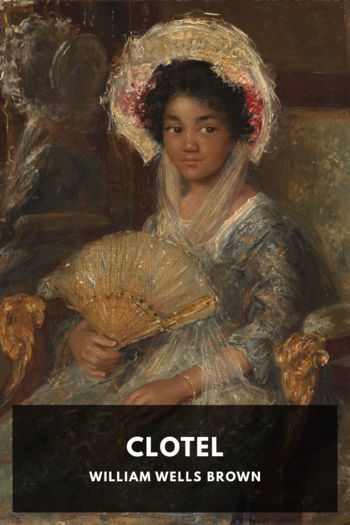Clotel, William Wells Brown [i like reading books .txt] 📗

- Author: William Wells Brown
Book online «Clotel, William Wells Brown [i like reading books .txt] 📗». Author William Wells Brown
“If I live to see next corn-planting time I will either be forty-five or fifty-five, I don’t know which.”
“Dat may be,” replied Pompey; “But now you is only thirty years old; dat is what marser says you is to be.”
“I know I is more den dat,” responded the man.
“I knows nothing about dat,” said Pompey; “but when you get in de market, an anybody axe you how old you is, an you tell ’em forty-five, marser will tie you up an gib you de whip like smoke. But if you tell ’em dat you is only thirty, den he wont.”
“Well den, I guess I will only be thirty when dey axe me,” replied the chattel.
“What your name?” inquired Pompey.
“Geemes,” answered the man.
“Oh, Uncle Jim, is it?”
“Yes.”
“Den you must have off dem dare whiskers of yours, an when you get to Orleans you must grease dat face an make it look shiney.” This was all said by Pompey in a manner which clearly showed that he knew what he was about. “How old is you?” asked Pompey of a tall, strong-looking man.
“I was twenty-nine last potato-digging time,” said the man.
“What’s your name?”
“My name is Tobias, but dey call me ‘Toby.’ ”
“Well, Toby, or Mr. Tobias, if dat will suit you better, you is now twenty-three years old, an no more. Dus you hear dat?”
“Yes,” responded Toby. Pompey gave each to understand how old he was to be when asked by persons who wished to purchase, and then reported to his master that the “old boys” were all right.
At eight o’clock on the evening of the third day, the lights of another steamer were seen in the distance, and apparently coming up very fast. This was a signal for a general commotion on the Patriot, and everything indicated that a steamboat race was at hand. Nothing can exceed the excitement attendant upon a steamboat race on the Mississippi river. By the time the boats had reached Memphis, they were side by side, and each exerting itself to keep the ascendancy in point of speed. The night was clear, the moon shining brightly, and the boats so near to each other that the passengers were calling out from one boat to the other. On board the Patriot, the firemen were using oil, lard, butter, and even bacon, with the wood, for the purpose of raising the steam to its highest pitch. The blaze, mingled with the black smoke, showed plainly that the other boat was burning more than wood. The two boats soon locked, so that the hands of the boats were passing from vessel to vessel, and the wildest excitement prevailed throughout amongst both passengers and crew. At this moment the engineer of the Patriot was seen to fasten down the safety-valve, so that no steam should escape. This was, indeed, a dangerous resort. A few of the boat hands who saw what had taken place, left that end of the boat for more secure quarters.
The Patriot stopped to take in passengers, and still no steam was permitted to escape. At the starting of the boat cold water was forced into the boilers by the machinery, and, as might have been expected, one of the boilers immediately exploded. One dense fog of steam filled every part of the vessel, while shrieks, groans, and cries were heard on every hand. The saloons and cabins soon had the appearance of a hospital. By this time the boat had landed, and the Columbia, the other boat, had come alongside to render assistance to the disabled steamer. The killed and scalded (nineteen in number) were put on shore, and the Patriot, taken in tow by the Columbia, was soon again on its way.
It was now twelve o’clock at night, and instead of the passengers being asleep the majority were ambling in the saloons. Thousands of dollars change hands during a passage from Louisville or St. Louis to New Orleans on a Mississippi steamer, and many men, and even ladies, are completely ruined. “Go call my boy, steward,” said Mr. Smith, as he took his cards one by one from the table. In a few moments a fine looking, bright-eyed mulatto boy, apparently about fifteen years of age, was standing by his master’s side at the table. “I will see you, and five hundred dollars better,” said Smith, as his servant Jerry approached the table.
“What price do you set on that boy?” asked Johnson, as he took a roll of bills from his pocket.
“He will bring a thousand dollars, any day, in the New Orleans market,” replied Smith.
“Then you bet the whole of the boy, do you?”
“Yes.”
“I call you, then,” said Johnson, at the same time spreading his cards out upon the table.
“You have beat me,” said Smith, as soon as he saw the cards. Jerry, who was standing on top of the table, with the bank notes and silver dollars round his feet, was now ordered to descend from the table.
“You will not forget that you belong to me,” said Johnson, as the young slave was stepping from the table to a chair.
“No, sir,” replied the chattel.
“Now go back to your bed, and be up in time tomorrow morning to brush my clothes and clean my boots, do you hear?”
“Yes, sir,” responded





Comments (0)